How to help a child not lag behind? It may involve guiding low-income parents at home
Through the KidStart programme, low-income families can get help for their child from a trained visitor in areas like health, nutrition, meeting milestones or even navigating childcare subsidies. CNA Insider finds out the difference it makes.
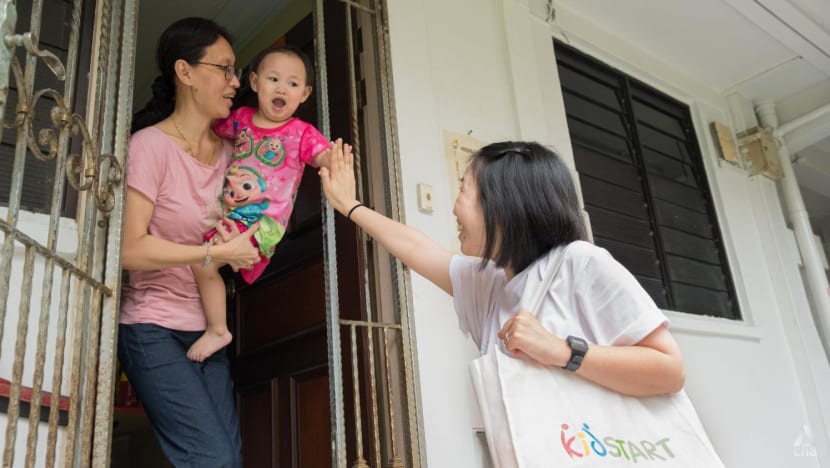
Goh Ling Ling and two-year-old Rosabelle have been journeying with KidStart practitioner Yolanda Lai (right) for more than a year now. (Photo: Tan Wen Lin/CNA)
- KidStart practitioners regularly visit low-income families with children aged up to three.
- They guide parents in areas such as breastfeeding and helping their child to walk and talk.
- The non-profit organisation aims to close the gap in resources between different families.
- Besides the programme benefiting children, parents also gain confidence.
SINGAPORE: When Yolanda Lai first met one-year-old Rosabelle Lum in late 2021, the infant was struggling to take her first steps.
Lai, 33, noticed that the girl was not yet able to walk while holding onto furniture — something she should have been doing by 10 to 12 months old.
Over the next few weeks, Lai introduced Rosabelle’s parents, Goh Ling Ling and Lum Suoon Hsien, to various ways of helping her.
They got her to practise standing and squatting by pasting stickers or drawing on a piece of paper stuck to the wall, for example, and to take a few steps while pushing a stool.
She began walking at 14 months, to the delight of her parents and Lai, who has since been heavily invested in Rosabelle’s growth and development.
In the past year, Lai has been visiting Rosabelle and her parents once every two or three weeks, charting her milestones and guiding them through everything from breastfeeding to nutrition to strategies for encouraging her to say her first words.
Lai is a KidStart practitioner, and her regular visits are part of a national programme that not only aims to give children from low-income families a leg-up, but also, as Goh realised for herself, gives parents more confidence in themselves.
MORE THAN EATING, SLEEPING WELL
While the KidStart programme covers children aged zero to six years, its home visitation component is meant for pregnant mothers and children up to three years old — to give parents practical knowledge in areas like nutrition and early childhood development.
There are also regular screenings in case early intervention is needed for the child’s growth or maternal well-being.
“We’re trying to … make it easy to get this knowledge. We go to where they are,” said KidStart Singapore chief executive officer Rahayu Buang. This also means its practitioners can see how the child behaves and interacts at home.
“The techniques we share with them become a lot more practical.”
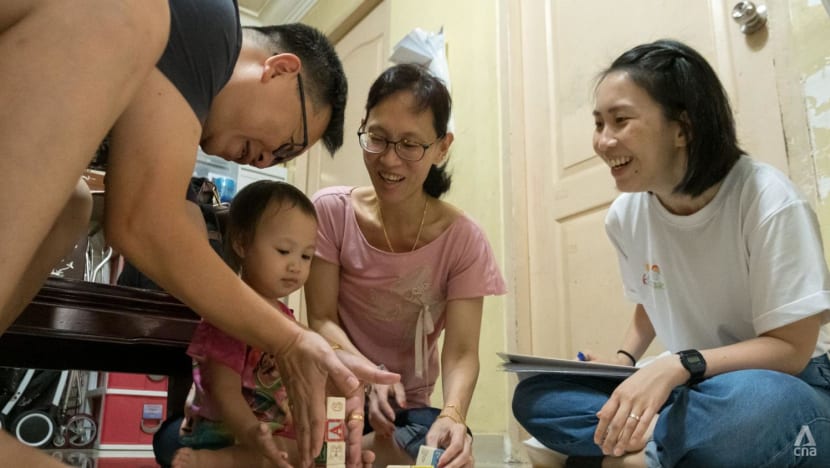
KidStart drew on similar models in the United States and Australia to develop and adapt the programme to the local context. It is meant for families with a gross monthly household income of S$2,500 and below or per capita income of S$650 and below.
Rahayu noted that children from low-income families tend to lag behind their peers, and even more so now with society more affluent than before.
“Parents who have resources can send their children for enrichment classes from a very young age,” she said. “For low-income families, this becomes a real difficulty.”
Low-income families also tend to face multiple stressors, and some things “could be dropped along the way”. For example, they may feel that so long as the children are healthy, meeting their developmental milestones may be less of a priority.
But there is more to the early years “than just custodial care and making sure the child eats and sleeps well”, she said. “It’s about language and brain development.
“So when we come in to work with the families, we teach them techniques: how to talk to your child, encourage curiosity, read to them. These are simple techniques that can be used, but they have to be learned.”
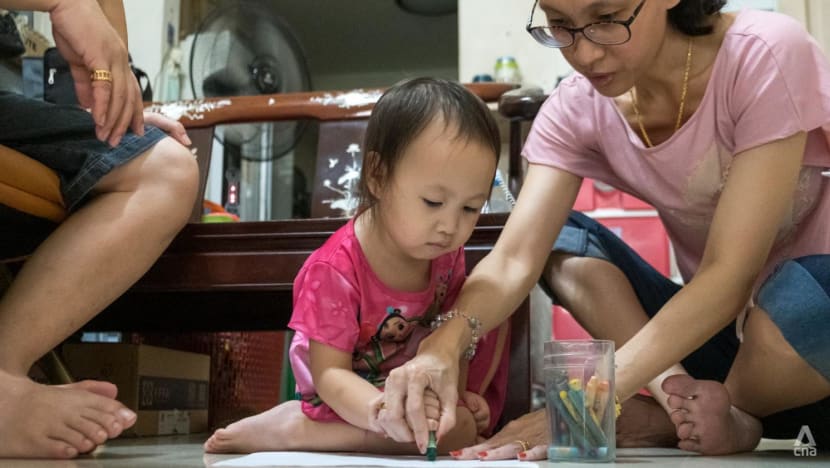
Why money skills should be taught from young:
KidStart was first launched in 2016 as a pilot programme led by the Early Childhood Development Agency. It started with 1,000 families in districts like Kreta Ayer, Bukit Merah and Taman Jurong.
The pilot turned out to be “very helpful”, said Rahayu, and KidStart expanded into more areas over the years. KidStart Singapore is now registered as a non-profit organisation.
She said parents in the home visitation programme have become more confident and competent. “That has a lot of knock-on effects,” she said. “When parents are confident, it’s not just to one child but all the children in the family.”
KidStart has also started expanding nationwide from this year.
NOT THERE TO JUDGE
But guiding parents in something as intimate as child-rearing, and going into their homes to do so, might make some people feel awkward. This is why building relationships with the family is one of the most important things practitioners do.
“It’s not about throwing a programme at them,” said Rahayu.
We want to make them feel comfortable, engaging with them and (showing them that) we’re here to help your child.”
In practice, this means coming in with a smile — as Lai does — greeting everyone (even the cat, she quipped) and making a point of complimenting parents on the good things she notices them doing.
“Parents love talking about their children,” she said. “So that makes it easier too.”
As the weeks go by and families warm up to her, she reiterates that she is not there to judge or correct, understanding that “you’re the parent, and you’re the one who knows your child best”.
Breaking the ice seems to come naturally to Lai, a former preschool teacher who describes herself with a grin as “very thick-skinned”. “Is it awkward? Maybe it is,” she said. “But I just breeze past it.”
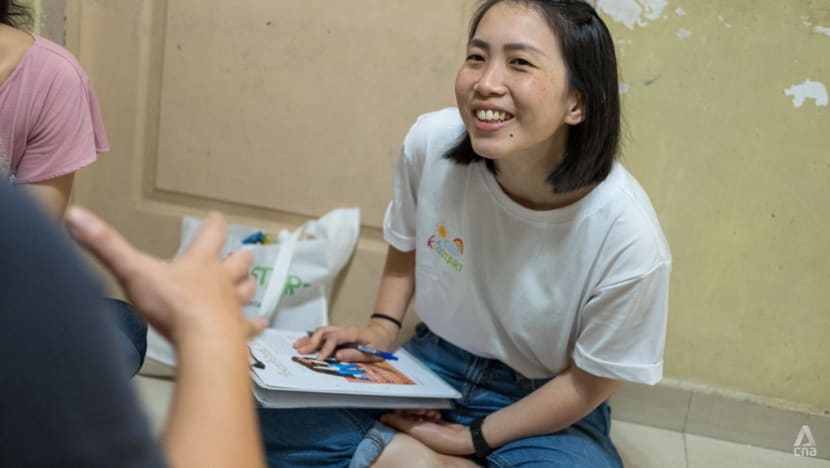
What took some work, however, was learning to hold back. This was, she said, the hardest thing for her to change.
“As a teacher, I could say things like … ‘You need to do this or do that,’” she said. “But now I’ve learnt I need to … bring the parents to the point where they can make the change themselves.”
For example, when Rosabelle’s parents brought up the challenge they faced trying to reduce her screen time, she responded: “Is that something you want to work on?”
Taking her cue from them, she suggested how, instead of removing it entirely, screen time could be made interactive by, for example, pausing the video now and then to talk to her about what goes on in the video.
“It’s all about asking them things like … what they think, (whether) they feel this is a concern,” she cited. “And how can you work on it?”
She does not, however, claim to know everything about child-rearing; all the more so because she does not have children herself.
“I always tell my families right from the start that although I’m the person you can approach, I don’t have all the answers,” she said.
But she has help in the form of a multidisciplinary team including doctors, nurses, speech therapists and psychologists she can consult at any point.
This means families can, for instance, get access to breastfeeding advice from a nurse. So when Goh worried about how to wean Rosabelle in preparation for preschool, Lai set up a video call with a nurse who could advise her.
Before they are assigned to families, KidStart practitioners also undergo training that covers aspects like breastfeeding, nutrition, child development and maternal mental well-being.
The training is guided by evidence-informed practice, including the Abecedarian Approach, which is a set of teaching and learning strategies focused on language development and high-quality adult-children interaction.
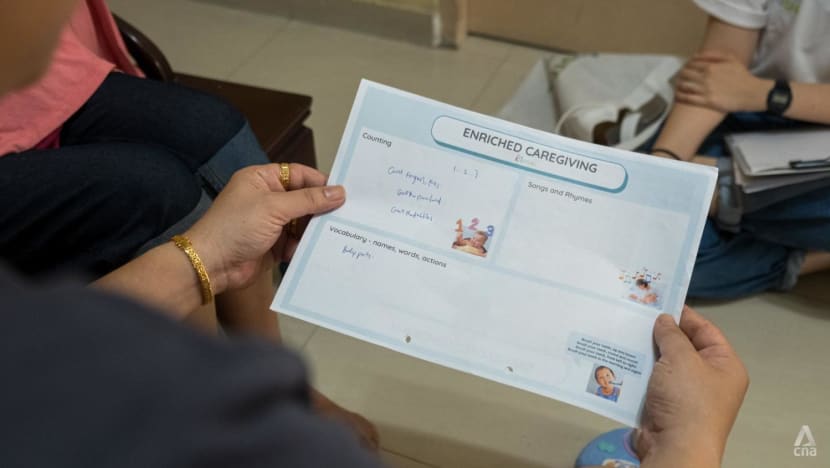
WHY SOME FAMILIES MAY HESITATE
Despite the benefits, and the fact that the programme is free, Lai said she comes across a small number of families who are hesitant to join. One of them was one of the first families she visited, in January 2021.
The father was in jail, while the mother was juggling the demands of three children aged one to six with a part-time warehouse job.
The oldest child was attending preschool but not regularly, and the youngest — whom Lai was assigned to — was behind in her motor skills.
The mother worried initially because she felt that she lacked the bandwidth and time to cope with regular KidStart meetings.
But Lai could tell she cared about her children and was trying to respond to and interact with them. “I could tell she had an interest (in learning),” she said. “I built on that and told her about the benefits.”
Today, the father is out of jail, all the children enrolled in preschool and all their milestones are being met.

But getting to the point of having a happy ending requires persistence, empathy and, perhaps, a thick skin.
There are instances where parents do not respond to Lai’s texts to arrange a visit. At other times, she may arrange a visit only to be confronted with a locked door and an empty house.
“There could be pressing concerns on their minds, so maybe child development isn’t really a priority,” she said softly. She will continue checking in with the families or, if there is another social service agency involved, ask after them.
There are times, despite all efforts, when families say they do not have the bandwidth and withdraw midway through the programme.
“I feel sad when this happens, because I know that the child and parents can still be helped. … But I also know that a lot of the time, there are other social agencies involved with the family,” she said.
“At least you know there’s somebody still working with them.”
‘NO HARM TRYING’
One parent who agreed to join KidStart immediately when her social worker introduced her to it was Goh, who said: “There’s no harm trying.”
The 42-year-old homemaker has five other children — aged between 12 and 24 — besides Rosabelle, and her mother helped her out previously. But her mother died in 2019.
“I could pass (them) to my mother whenever I wanted to relax, but now, even when I want to relax, I have to take care of (Rosabelle),” she said.
Her husband, a security officer who works 12-hour shifts five days a week, gives her a break whenever he can. Sometimes the older children pitch in. But she is Rosabelle’s main caregiver.
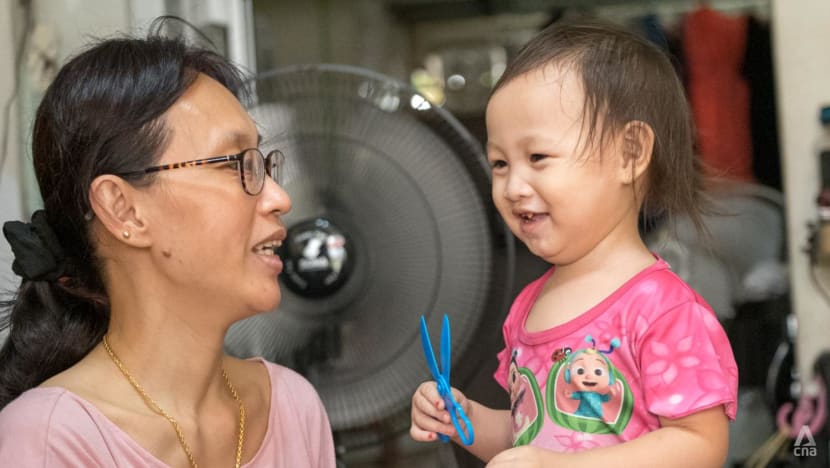
She is happy to see Rosabelle grow up and to learn her likes and dislikes. But it can be stressful, she acknowledged; all the more so because she is on medication for depression, which was diagnosed before Rosabelle was born.
When Rosabelle was not speaking much compared to her siblings when they were the same age, “I just told myself that she just doesn’t want to talk”, said Goh.
She recalled her mother always telling her not to worry as children would speak when they are ready. But she couldn’t help worrying.
Three of her older children have mild dyslexia, and at times, she wondered if she was to blame. “Is it because my studies were bad when I was young, and I didn’t teach them properly?” she questioned.
But as she tried the techniques Lai taught her — singing Rosabelle a new song in the bath, counting aloud during their daily activities and talking about the pictures in the books she reads to her daughter — she saw the difference. That gave her confidence.
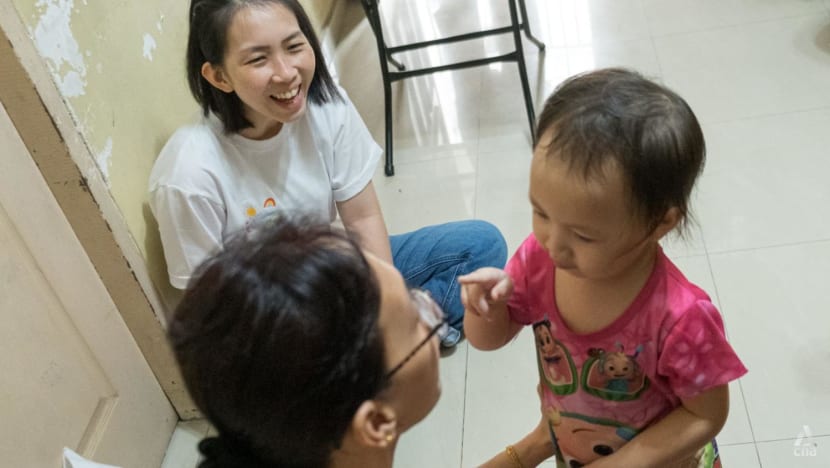
Lai checks in with Goh regularly to also make sure she takes care of herself. They keep in touch via WhatsApp, and every now and then Goh sends “funny videos” of Rosabelle, which the pair will laugh about together.
“She knows it’s not easy for me as a mother of six,” Goh said. “So she’ll comfort me and tell me not to worry so much.”
FROM A FOUR TO AN EIGHT
On each visit, Lai encourages Goh to take stock of her life and asks her not only what could be improved, but also what went well.
And seeing Goh’s face light up when she describes an improvement or milestone is a reminder that Rosabelle is not the only one who has benefited from the programme.
“It’s really nice to see and such a privilege to journey with her,” said Lai. “It’s not something I take lightly.”
Goh had previously given herself a four out of 10 when asked to rate her confidence level as a parent. With the help of KidStart, this has gone up to an eight now.
“I wasn’t sure if what I was doing was right or wrong,” she said. “But now I can see the improvement, so I know what to do.”
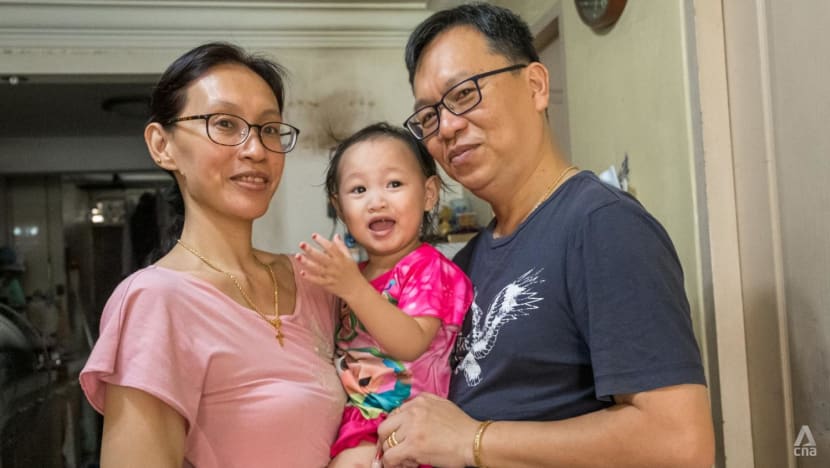
Rosabelle still has some way to go: Her parents agree she could do with less screen time, and Rosabelle is still reluctant to be weaned off the breast.
She will start preschool soon, and the family will need to find a suitable school as well as figure out the subsidies available. When that time comes, Lai will be there.
Read this story in Bahasa Melayu here.
















